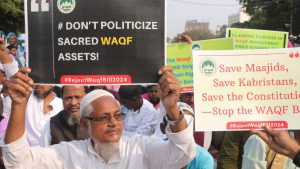Synopsis:
Waqf Amendment Act interim order by the Supreme Court halts key provisions while refusing full stay. Muslim organizations, AIMPLB, and leaders like Arshad Madani and Asaduddin Owaisi share strong reactions on the verdict.
By Qalam Times News Network | New Delhi | September 15, 2025
Supreme Court’s Interim Verdict
The Waqf Amendment Act faced its first major legal test on Monday, September 15, when the Supreme Court issued an interim order. While the court refused to impose a complete stay on the legislation, it temporarily suspended some contentious provisions that had been at the center of concern for Muslim organizations.
A bench led by Chief Justice B.R. Gavai and Justice A.G. Masih observed that constitutional validity is generally presumed in favor of a law passed by Parliament, but certain provisions warranted interim protection. The decision has offered partial relief for the protection of Muslim community properties, though the broader battle over the Act’s legitimacy remains unresolved.

Arshad Madani and Jamiat Ulama-e-Hind Welcome Relief
Reacting to the ruling, Maulana Arshad Madani, President of Jamiat Ulama-e-Hind, described it as “a significant step in preventing government interference in Muslim properties.” He emphasized that while the relief on three disputed provisions is welcome, the organization will continue its legal and democratic struggle until the Waqf Amendment Act is struck down in its entirety.
Madani further argued that the Act represents a direct attack on the Constitution, which guarantees equal rights and complete religious freedom to minorities. “This law is an unconstitutional conspiracy to strip Muslims of their religious freedom. We are confident the Supreme Court will ultimately deliver full constitutional justice,” he added.
Owaisi and Shia Scholars Term the Verdict Positive but Limited
AIMIM chief Asaduddin Owaisi, one of the petitioners, said the interim order was a relief, particularly as the court accepted their arguments on “Waqf by user” and protected monuments. He welcomed the removal of the five-year clause, but noted, “We will wait for the final verdict.”
Shia cleric Syed Kalbe Jawwad Naqvi hailed the order as “positive for the Muslim community,” while Maulana Syed Akhtar Rizvi underlined that it was crucial in curbing arbitrary administrative powers over Waqf properties.
AIMPLB Expresses Cautious Satisfaction
The All India Muslim Personal Law Board (AIMPLB) also welcomed the interim protection. Executive member Syed Qasim Rasool Ilyas said the decision upheld Muslim religious freedom by striking down key provisions. Another senior member, Maulana Khalid Rasheed Farangi Mahli, noted: “Although we sought a complete stay on the Act, the court’s suspension of several critical clauses is a welcome development. Our legal struggle will continue.”
Political and Community Implications
The ruling has drawn attention not only from Muslim organizations but also from political circles, with the debate now shifting to how the final judgment may reshape the future of Waqf properties across India. For now, the interim order provides a partial safeguard, but the community remains resolute in challenging the Waqf Amendment Act until a final resolution is reached.







